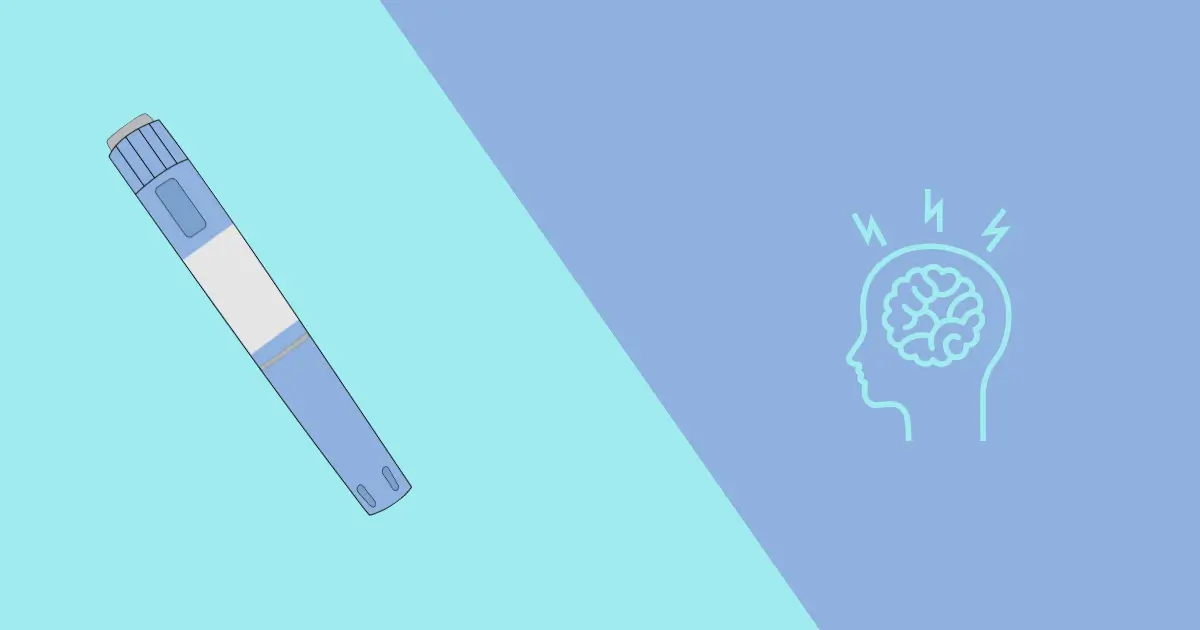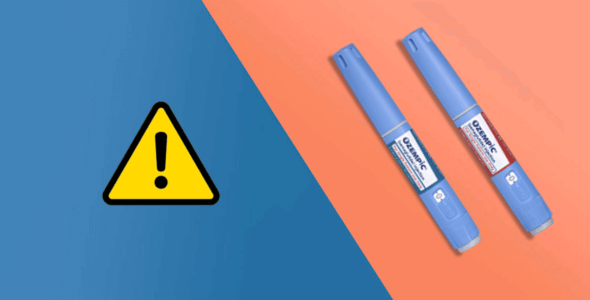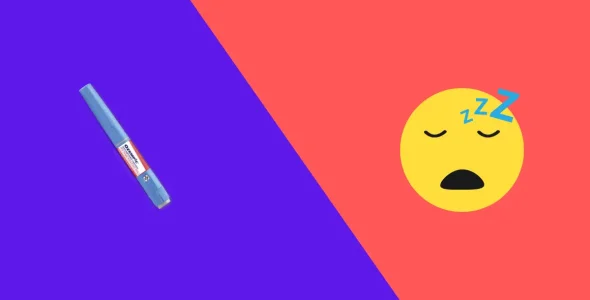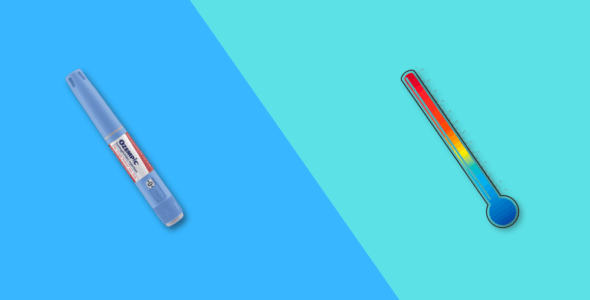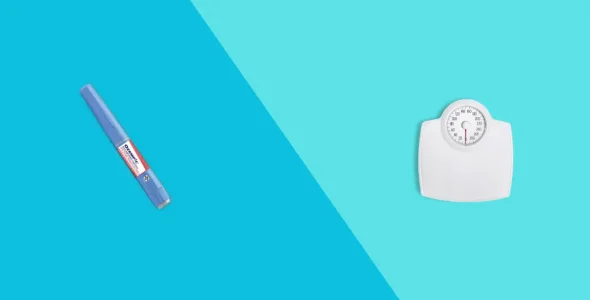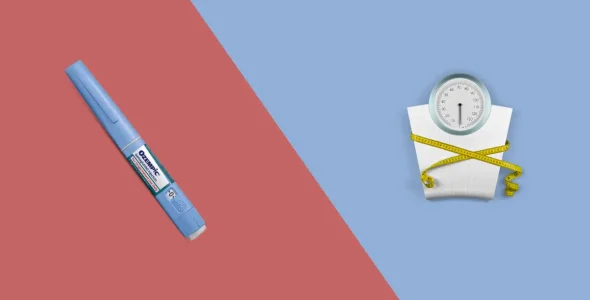Does Ozempic cause headaches?
Key highlights
- Ozempic (semaglutide) is a glucagon-like peptide-1 (GLP-1) receptor agonist manufactured by Novo Nordisk to lower blood sugar levels in people with type 2 diabetes.
- While Ozempic doesn’t directly cause headaches, some people may experience them due to side effects like low blood sugar (hypoglycemia) or dehydration.
- Dehydration from vomiting or diarrhea, and hormonal changes from Ozempic can also trigger headaches.
- Stay hydrated, eat balanced meals, manage stress, get enough sleep, and check your blood sugar levels regularly to help prevent or reduce headaches.
- Headaches with Ozempic are usually manageable with the right care, seek medical attention if headaches last a long time or worsen. They can adjust your treatment or suggest ways to manage your symptoms.
Are you dealing with headaches while using Ozempic? You’re not alone. Many people experience this side effect. Like any medicine, Ozempic can cause side effects. The most common ones are stomach problems, like nausea, vomiting, diarrhea, loss of appetite, constipation, and stomach pain, especially when you first start taking it.
Ozempic (semaglutide) is a prescription medication used to lower blood sugar levels in people with type 2 diabetes and off-label for chronic weight management. It is also used to reduce the risk of major adverse cardiovascular events in adults with cardiovascular disease.
Even though Ozempic doesn’t directly affect the brain, some people have reported getting headaches while using it. This is likely due to common side effects of the drug, like low blood sugar and dehydration.
Here’s what you need to know about why you might get headaches while taking Ozempic, how to manage them, and when to seek medical attention.
What is Ozempic and how does it work?
Ozempic (semaglutide) is an FDA-approved glucagon-like peptide-1 (GLP-1) receptor agonist made by Novo Nordisk to lower blood sugar in people with type 2 diabetes and off-label for weight loss in people with obesity and overweight.
Ozempic lowers blood sugar by mimicking a natural hormone called GLP-1 that your body makes after you eat. This helps your body release insulin and reduce sugar production, providing better blood sugar control. It also helps with weight loss by reducing appetite, slowing down digestion (gastroparesis), and making you feel fuller longer.
Can Ozempic cause headaches?
Not exactly. In a clinical review report, experts looked at people taking Ozempic and other diabetes medications. They found no evidence that people taking Ozempic had more headaches than others. This suggests that Ozempic itself doesn’t directly cause headaches.
Headaches are not listed as a direct side effect in Ozempic clinical trials. In other clinical trials where a higher dose of semaglutide was used for weight management, 15.2% of people taking the drug had headaches. However, 12.2% of people who took a placebo (a treatment with no active medication) also had headaches during the same trial.
What types of headaches can Ozempic cause?
Ozempic alone or with certain blood sugar medications can cause potential side effects that might lead to migraines, eye-related migraines, or dizziness while taking it
Researchers are looking into how low blood sugar (hypoglycemia) might be linked to migraines. Migraine symptoms can include:
- Severe, throbbing pain on one side of the head
- Sensitivity to light, noise, or smell
- Nausea
- Vomiting
Taking Ozempic alone or with certain blood sugar medications can lead to possible side effects that may lead to ocular migraines. Ocular migraines, also called retinal migraines, are a type of migraine. The symptoms usually affect just one eye and last less than an hour. They often start with a small blind spot in the center of your vision that gets bigger and may also affect your side (peripheral) vision.
How to recognize Ozempic-related headaches
It’s more likely that headaches caused by Ozempic occur soon after starting Ozempic or after a dosage increase and are typically associated with other symptoms like nausea, dizziness, vomiting, and fatigue. The severity usually ranges from mild to severe and should subside over time as your body gets used to the medication.
Why does Ozempic cause headaches?
Headaches aren’t directly caused by Ozempic, meaning the medication itself doesn’t trigger them. However, some side effects of Ozempic, like dehydration from not drinking enough or from diarrhea and vomiting, can lead to headaches. Dehydration makes your body’s tissues shrink, which puts pressure on pain receptors in the brain, causing pain.
Low blood sugar (hypoglycemia) can also cause headaches while using Ozempic. Although Ozempic helps lower blood sugar, it can take time to find the right dose. According to the maker of Ozempic, Novo Nordisk, low blood sugar is more likely if you take other diabetes or blood sugar medications like insulin and sulfonylureas along with Ozempic.
Some people taking Ozempic may have more serious side effects. If you notice signs of an allergic reaction, injection site reactions, kidney problems, pancreatitis (inflammation of the pancreas), severe abdominal pain, gallstones, gallbladder issues, or diabetic retinopathy, seek emergency medical care immediately.
1. Low blood sugar levels (hypoglycemia)
Ozempic lowers your blood sugar, which can sometimes cause it to drop too low (hypoglycemia). This doesn’t happen very often, but people who take other medications that lower blood sugar, like insulin or sulfonylureas, are more likely to experience low blood glucose while on Ozempic.
In studies, less than 1% of people taking Ozempic for weight management experienced low blood sugar (hypoglycemia). However, nearly 25% of people who took Ozempic along with insulin or other diabetes medications (insulin, metformin, sulfonylurea) had low blood sugar.
Some doctors have noticed that a small number of patients get mild headaches, especially on the day they take the injection, but these headaches usually go away by the time of the next dose.
2. Dehydration
Dehydration is another reason people taking Ozempic might get headaches.
Ozempic slows down how quickly the stomach empties, which can cause nausea, vomiting, and diarrhea. Stomach problems are one of the most common side effects of Ozempic.
Ozempic also makes you feel full for longer, so you may not feel as hungry or thirsty. If you’re not drinking enough water because you don’t feel thirsty, you could get dehydrated. And if you’re also losing fluids from vomiting or diarrhea, dehydration can happen even faster.
Dehydration can cause headaches and may also trigger migraines or tension headaches.
3. Hormonal and neurochemical changes
Ozempic works by affecting hormones in your body, particularly by increasing a hormone called GLP-1. This hormone helps lower blood sugar and control appetite. However, these changes in hormones can also impact brain chemicals (neurological pathways) and how your nervous system works, which might lead to headaches for some people. The exact reason is not fully understood, but these hormonal and neurochemical changes may trigger headache symptoms as your body adjusts to the medication.
4. Medication interactions
Other medications you are taking may be causing headaches. A wide variety of other medications and supplements are known to cause headaches, including:
- Medications containing hormones, like birth control pills and hormone therapy for menopause
- Erectile dysfunction medications
- Caffeine (due to caffeine withdrawal)
- Some heart and blood pressure medications
- Some vitamins
If you stop taking the medicine, supplement or vitamin, or lower the dose, your headache will often go away. If you believe that your headache is caused by a prescription medication you are taking, speak with your doctor and do not stop taking the medication until your doctor says it’s safe to do so.
Rebound headache is a type of chronic headache caused by overuse of pain medication. A pain medication may work for some time but once you stop taking the medication, the headache returns and is often worse than it was before.
How to get relief from headaches while on Ozempic
Here are some steps to treat and prevent headaches while taking Ozempic.
1. Stay hydrated
Dehydration with Ozempic is often caused by gastrointestinal issues like diarrhea and vomiting. To help prevent this, you need to drink plenty of fluids and follow your healthcare provider’s medical advice for Ozempic to reduce these side effects.
Make sure to drink plenty of water throughout the day to avoid dehydration and headaches. Since you might not feel thirsty while taking Ozempic, try other ways to remind yourself to drink. You could mark a water bottle or set a timer on your phone to help you remember to stay hydrated.
In addition to drinking water, it’s also important to maintain your electrolyte balance. Electrolytes are minerals like sodium, potassium, and magnesium that help control body functions such as muscle movement and nerve functions. When you’re dehydrated, you can lose these minerals, leading to further issues like headaches, muscle cramps, or dizziness.
2. Balanced nutrition
Novo Nordisk recommends eating bland food, eating slowly, eating smaller meals more often, and avoiding heavy, high-fat, or high-sugar meals to help with stomach problems. Foods with lots of water like soups or gelatin can also help you stay hydrated without irritating your stomach.
Also, to keep your blood sugar stable, follow a semaglutide diet plan that include complex carbs like whole grains, veggies, and legumes in your meals. These release energy slower and prevent blood sugar highs and lows. Lean protein sources like chicken, turkey, fish, and tofu will keep you fuller for longer and support stable blood sugar.
3. Manage stress
Stress can make headaches worse, so finding ways to relax is important. You can try activities like deep breathing, meditation, yoga, or taking breaks throughout the day to unwind. Regular exercise can also help reduce stress and prevent headaches.
4. Get good sleep
Lack of sleep or poor-quality sleep can trigger headaches. Aim for 7-9 hours of sleep each night. Make sure your sleeping environment is comfortable, quiet, and dark. Also, try to keep a consistent sleep schedule by going to bed and waking up at the same time each day.
5. Check blood sugar levels
If you feel a headache coming on, check your blood sugar. If it’s low, eat a snack or drink some orange juice to raise it.
If you think you’re drinking enough fluids but still have headaches, see your healthcare provider for a checkup. Ask if low blood sugar might be the cause or check your blood sugar at home with a glucometer. If you’re taking insulin or sulfonylureas along with Ozempic, you may be more likely to experience low blood sugar.
6. Try over-the-counter pain relievers
You can also take over-the-counter (OTC) pain relievers like acetaminophen or ibuprofen to help with headaches. But if you have chronic kidney disease, check with your doctor before taking ibuprofen. They can recommend the best way to relieve headaches caused by semaglutide for your situation.
While over-the-counter pain relievers can help temporarily, it’s important not to use them too often. Overusing painkillers can lead to rebound headaches, which means you might get headaches more frequently once the medication wears off. To prevent this, use pain relievers only as directed by your healthcare provider and for short periods.
7. Speak to your healthcare provider
If you experience severe or persistent headaches that don’t improve with home remedies or are accompanied by associated symptoms, vision changes, confusion, or other neurological symptoms, speak with your healthcare provider immediately. They can help you figure out what’s causing the headaches and if they’re related to Ozempic or something else. They may adjust your medication, change your dose, or try another medication to help with the headaches.
They can also check for other things like low blood sugar or dehydration and give you tips on how to manage those with your current medical conditions. Always talk to your healthcare provider before making any changes to your treatment.
This weight loss drug also has a black box warning from the FDA for the risk of thyroid tumors or thyroid cancer.
How to avoid headaches with Ozempic
To help prevent headaches while using Ozempic, you can try the following:
- Gradual dosage increases: Drinking enough fluids throughout the day can help prevent dehydration, which can cause headaches.
- Stay hydrated: Drinking enough fluids throughout the day can help prevent dehydration, which can cause headaches.
- Consistent food schedule: Try eating regular meals to help maintain stable blood sugar levels throughout the day.
- Avoid low blood sugar: A headache with Ozempic may be a sign of low blood sugar. To prevent this, follow your doctor’s advice on managing your blood sugar. This might include checking your blood sugar regularly and sticking to a meal plan. Your healthcare provider may also suggest adjusting other medications you’re taking.
Frequently asked questions
Are headaches a common side effect of Ozempic?
No, headaches are not a common side effect of Ozempic. Ozempic itself doesn’t cause headaches. However, if you take Ozempic with other medications, it could lead to low blood sugar (hypoglycemia), and a headache can be a symptom of low blood sugar.
Ozempic may also cause dehydration if you have kidney problems (acute kidney injury or AKI), which can also lead to headaches.
If you get a headache while using Ozempic, talk to your healthcare provider.
How long do headaches with Ozempic last?
Headaches from Ozempic can vary in how long they last. For most people, the headaches might only last a few days to a couple of weeks, as their body gets used to the medication. However, if headaches continue or worsen, it’s important to talk to your healthcare professional.
It’s worth noting that the exact duration of these headaches is not specified in the clinical trials, as it depends on individual responses to the medication.
If you’re experiencing frequent or long-lasting headaches, it’s best to consult your healthcare provider for advice.
Will Ozempic headaches go away on their own?
Headaches may go away on their own as your body gets used to the medication. If the headaches are associated with other side effects linked to dehydration like nausea or vomiting, the headaches should improve once the underlying issues are resolved.
Can I take Ozempic at night to avoid headaches?
Taking Ozempic at night might help avoid headaches but it varies by person. If the headaches are linked to low blood sugar, taking the medication at night might help by preventing hypoglycemia during sleep when you’re less likely to notice symptoms. Some people report that taking Ozempic at night helps minimize nausea, which can also contribute to headaches. The manufacturer doesn’t recommend a preferred time for taking the medication.
Bottom line
Ozempic is a prescription drug approved by the FDA for type 2 diabetes and used off-label for weight loss.
Some people who take Ozempic alone or with other medications report headaches. Headaches can happen if you have low blood sugar or are dehydrated, which can happen if you’re vomiting or have diarrhea. It’s also possible that other medications you’re taking are causing the headaches.
Fortunately, these headaches can be managed with proper care like drinking enough water, eating balanced meals, managing stress, keeping your blood sugar in check, and using OTC pain relievers.
If you experience headaches, speak with your healthcare provider. They can provide personalized advice, adjust your treatment plan if needed, and help you find the best way to manage your symptoms.

